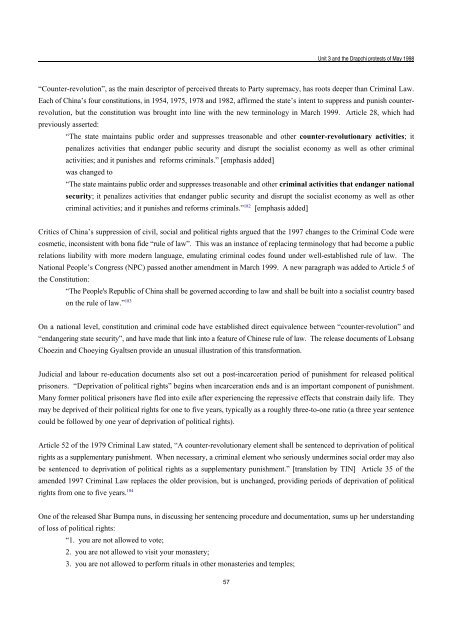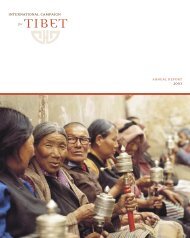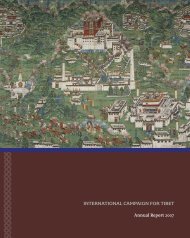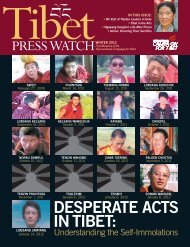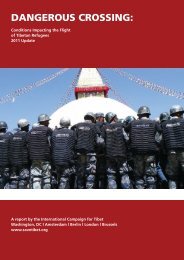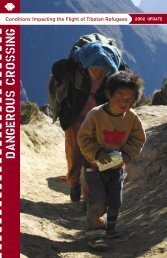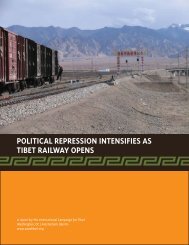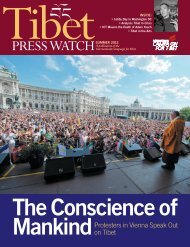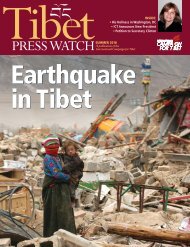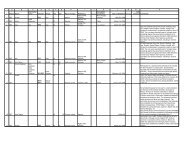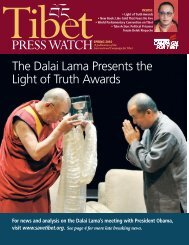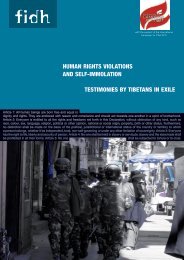download the report - International Campaign for Tibet
download the report - International Campaign for Tibet
download the report - International Campaign for Tibet
- No tags were found...
You also want an ePaper? Increase the reach of your titles
YUMPU automatically turns print PDFs into web optimized ePapers that Google loves.
Unit 3 and <strong>the</strong> Drapchi protests of May 1998“Counter-revolution”, as <strong>the</strong> main descriptor of perceived threats to Party supremacy, has roots deeper than Criminal Law.Each of China’s four constitutions, in 1954, 1975, 1978 and 1982, affirmed <strong>the</strong> state’s intent to suppress and punish counterrevolution,but <strong>the</strong> constitution was brought into line with <strong>the</strong> new terminology in March 1999. Article 28, which hadpreviously asserted:“The state maintains public order and suppresses treasonable and o<strong>the</strong>r counter-revolutionary activities; itpenalizes activities that endanger public security and disrupt <strong>the</strong> socialist economy as well as o<strong>the</strong>r criminalactivities; and it punishes and re<strong>for</strong>ms criminals.” [emphasis added]was changed to“The state maintains public order and suppresses treasonable and o<strong>the</strong>r criminal activities that endanger nationalsecurity; it penalizes activities that endanger public security and disrupt <strong>the</strong> socialist economy as well as o<strong>the</strong>r182criminal activities; and it punishes and re<strong>for</strong>ms criminals.” [emphasis added]Critics of China’s suppression of civil, social and political rights argued that <strong>the</strong> 1997 changes to <strong>the</strong> Criminal Code werecosmetic, inconsistent with bona fide “rule of law”. This was an instance of replacing terminology that had become a publicrelations liability with more modern language, emulating criminal codes found under well-established rule of law. TheNational People’s Congress (NPC) passed ano<strong>the</strong>r amendment in March 1999. A new paragraph was added to Article 5 of<strong>the</strong> Constitution:“The People's Republic of China shall be governed according to law and shall be built into a socialist country basedon <strong>the</strong> rule of law.” 183On a national level, constitution and criminal code have established direct equivalence between “counter-revolution” and“endangering state security”, and have made that link into a feature of Chinese rule of law. The release documents of LobsangChoezin and Choeying Gyaltsen provide an unusual illustration of this trans<strong>for</strong>mation.Judicial and labour re-education documents also set out a post-incarceration period of punishment <strong>for</strong> released politicalprisoners. “Deprivation of political rights” begins when incarceration ends and is an important component of punishment.Many <strong>for</strong>mer political prisoners have fled into exile after experiencing <strong>the</strong> repressive effects that constrain daily life. Theymay be deprived of <strong>the</strong>ir political rights <strong>for</strong> one to five years, typically as a roughly three-to-one ratio (a three year sentencecould be followed by one year of deprivation of political rights).Article 52 of <strong>the</strong> 1979 Criminal Law stated, “A counter-revolutionary element shall be sentenced to deprivation of politicalrights as a supplementary punishment. When necessary, a criminal element who seriously undermines social order may alsobe sentenced to deprivation of political rights as a supplementary punishment.” [translation by TIN] Article 35 of <strong>the</strong>amended 1997 Criminal Law replaces <strong>the</strong> older provision, but is unchanged, providing periods of deprivation of politicalrights from one to five years. 184One of <strong>the</strong> released Shar Bumpa nuns, in discussing her sentencing procedure and documentation, sums up her understandingof loss of political rights:“1. you are not allowed to vote;2. you are not allowed to visit your monastery;3. you are not allowed to per<strong>for</strong>m rituals in o<strong>the</strong>r monasteries and temples;57


